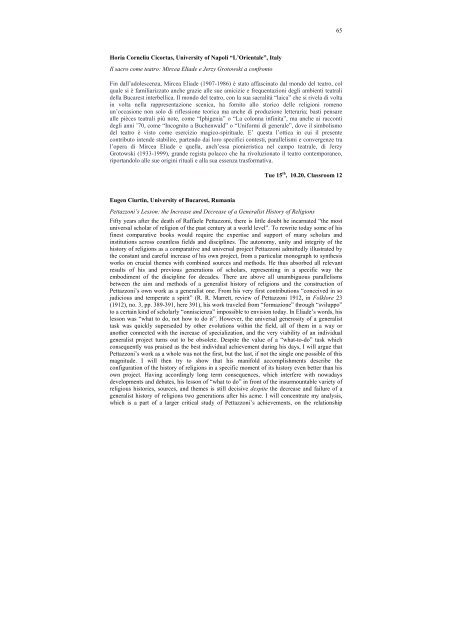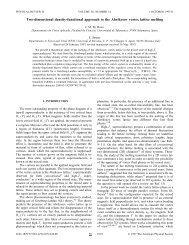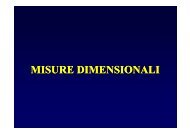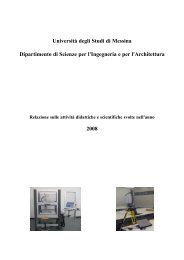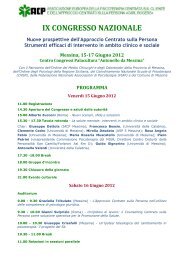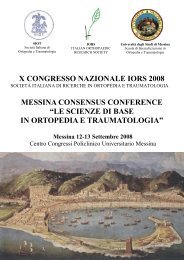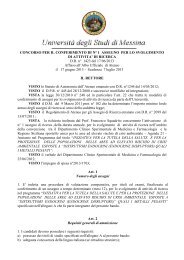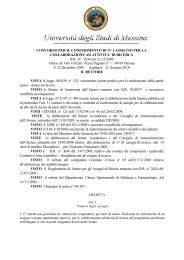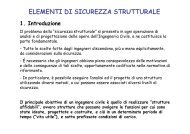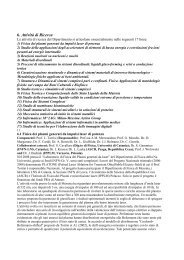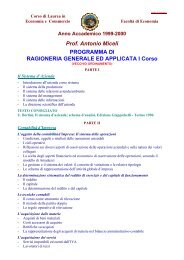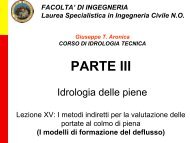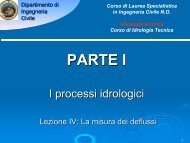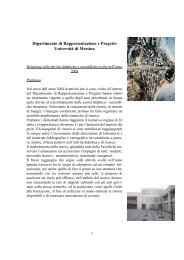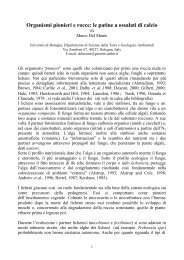PROGRAMME AND ABSTRACTS - Università degli Studi di Messina
PROGRAMME AND ABSTRACTS - Università degli Studi di Messina
PROGRAMME AND ABSTRACTS - Università degli Studi di Messina
Create successful ePaper yourself
Turn your PDF publications into a flip-book with our unique Google optimized e-Paper software.
Horia Corneliu Cicortas, University of Napoli “L’Orientale”, Italy<br />
Il sacro come teatro: Mircea Eliade e Jerzy Grotowski a confronto<br />
Fin dall’adolescenza, Mircea Eliade (1907-1986) è stato affascinato dal mondo del teatro, col<br />
quale si è familiarizzato anche grazie alle sue amicizie e frequentazioni <strong>degli</strong> ambienti teatrali<br />
della Bucarest interbellica. Il mondo del teatro, con la sua sacralità “laica” che si rivela <strong>di</strong> volta<br />
in volta nella rappresentazione scenica, ha fornito allo storico delle religioni romeno<br />
un’occasione non solo <strong>di</strong> riflessione teorica ma anche <strong>di</strong> produzione letteraria; basti pensare<br />
alle pièces teatrali più note, come “Iphigenia” o “La colonna infinita”, ma anche ai racconti<br />
<strong>degli</strong> anni ’70, come “Incognito a Buchenwald” o “Uniformi <strong>di</strong> generale”, dove il simbolismo<br />
del teatro è visto come esercizio magico-spirituale. E’ questa l’ottica in cui il presente<br />
contributo intende stabilire, partendo dai loro specifici contesti, parallelismi e convergenze tra<br />
l’opera <strong>di</strong> Mircea Eliade e quella, anch’essa pionieristica nel campo teatrale, <strong>di</strong> Jerzy<br />
Grotowski (1933-1999), grande regista polacco che ha rivoluzionato il teatro contemporaneo,<br />
riportandolo alle sue origini rituali e alla sua essenza trasformativa.<br />
Eugen Ciurtin, University of Bucarest, Rumania<br />
65<br />
Tue 15 th , 10.20, Classroom 12<br />
Pettazzoni’s Lesson: the Increase and Decrease of a Generalist History of Religions<br />
Fifty years after the death of Raffaele Pettazzoni, there is little doubt he incarnated “the most<br />
universal scholar of religion of the past century at a world level”. To rewrite today some of his<br />
finest comparative books would require the expertise and support of many scholars and<br />
institutions across countless fields and <strong>di</strong>sciplines. The autonomy, unity and integrity of the<br />
history of religions as a comparative and universal project Pettazzoni admittedly illustrated by<br />
the constant and careful increase of his own project, from a particular monograph to synthesis<br />
works on crucial themes with combined sources and methods. He thus absorbed all relevant<br />
results of his and previous generations of scholars, representing in a specific way the<br />
embo<strong>di</strong>ment of the <strong>di</strong>scipline for decades. There are above all unambiguous parallelisms<br />
between the aim and methods of a generalist history of religions and the construction of<br />
Pettazzoni’s own work as a generalist one. From his very first contributions “conceived in so<br />
ju<strong>di</strong>cious and temperate a spirit” (R. R. Marrett, review of Pettazzoni 1912, in Folklore 23<br />
(1912), no. 3, pp. 389-391, here 391), his work traveled from “formazione” through “sviluppo”<br />
to a certain kind of scholarly “onniscienza” impossible to envision today. In Eliade’s words, his<br />
lesson was “what to do, not how to do it”. However, the universal generosity of a generalist<br />
task was quickly superseded by other evolutions within the field, all of them in a way or<br />
another connected with the increase of specialization, and the very viability of an in<strong>di</strong>vidual<br />
generalist project turns out to be obsolete. Despite the value of a “what-to-do” task which<br />
consequently was praised as the best in<strong>di</strong>vidual achievement during his days, I will argue that<br />
Pettazzoni’s work as a whole was not the first, but the last, if not the single one possible of this<br />
magnitude. I will then try to show that his manifold accomplishments describe the<br />
configuration of the history of religions in a specific moment of its history even better than his<br />
own project. Having accor<strong>di</strong>ngly long term consequences, which interfere with nowadays<br />
developments and debates, his lesson of “what to do” in front of the insurmountable variety of<br />
religious histories, sources, and themes is still decisive despite the decrease and failure of a<br />
generalist history of religions two generations after his acme. I will concentrate my analysis,<br />
which is a part of a larger critical study of Pettazzoni’s achievements, on the relationship


